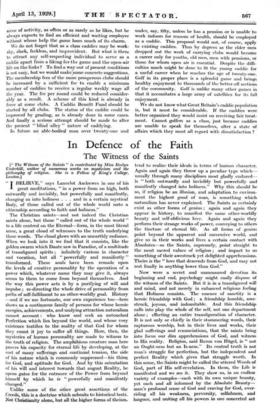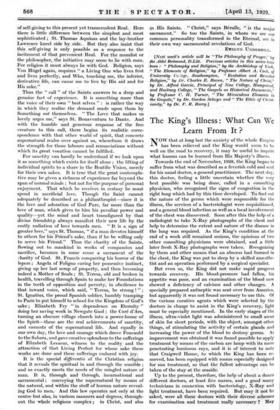In Defence of the Faith
The Witness of the Saints
[" The Witness of the Saints" is contributed by Miss Evelyn Underhill, author of numerous works on mysticism and the philosophy of religion. She is a Fellow of King's College, London.] " y BELIEVE," says Lancelot Andrewes in one of his great meditations, " in a power from on high, both outwardly and invisibly, but powerfully and manifestly, changing us into holiness . . . and in a certain mystical Body, of those called out of the whole world unto a citizenship according to faith and holiness."
The Christian saints—and not indeed the Christian saints alone, but those " called out of the whole world " to a life centred on the Eternal—form, in the most literal sense, a great cloud of witnesses to the truth underlying those words. The cloud glows with an unearthly radiance. When we look into it we find that it consists, like the golden swarm which Dante saw in Paradise, of a multitude of transfigured spirits ; infinitely various in character and vocation, but all " powerfully and manifestly " transformed. These souls have been remade upon the levels of creative personality by the operation of a power which, whatever name they may give it, always seems to them to come from beyond themselves. And the way this power acts is by a purifying of will and impulse-; re-directing the whole drive of personality from paths of self-fulfilment to an other-worldly goal. History —and if we are fortunate, our own experience too—here shows us a continuous family of persons for whose heroic energies, achievements, and undying attraction naturalism cannot account : who know and seek an untouched Perfection which lies beyond the world, and whose very existence testifies to the reality of that God for whom they count it joy to suffer all things. Here, then, the mysteries of human personality are made to witness to the truth of religion. The amphibious creature man here proves his capacity for eternal life by developing, at the cost of many sufferings and continual tension, the side of his nature which is commonly suppressed—his thirst for God, and aptitude for God. And by this orientation of his will and interest towards that august Reality, he opens gates for the entrance of the Power from beyond himself by which he is " powerfully and manifestly changed."
Unlike some of the other great assertions of the Creedi, this is a doctrine which submits to historical tests. Not Christianity alone, but all the higher forms of theism, tend to realize their ideals in terms of human character. Again and again they throw up a peculiar type which— usually through many disciplines most gladly endured— is " both outwardly and invisibly but powerfully and manifestly changed into holiness." Why this should be so, if religion be an illusion, and adaptation, to environ- ment the highest good of man, is something which naturalism has never explained. The Saints as certainly exist as other forms of genius ; again and again they appear in history, to manifest the same other-worldly beauty and self-oblivious love. Again and again they perform their strange works of power, conveying to others the tincture of eternal life. As all forms of genius point beyond the apparent and successive world, and give us in their works and lives a certain contact with Absolutes—so the Saints, supremely, point straight to the most sacred values of religion ; and impart to us something of their awestruck yet delighted apprehensions. Theirs is the " love that descends from God, and may not rest finally in anything lower than God."
Now were a secret and unmeasured devotion its beginning and end, psychology might easily dispose of the witness of the Saints. But it is m a transfigured will and mind, and not merely in enhanced religious feeling that Holiness consists. The essence of sanctity is a heroic friendship with God ; a friendship humble, awe- struck, joyous, and indomitable. And this friendship calls into play the whole of the self, not one department alone ; effecting an entire transfiguration of character. It is not only or chiefly in their stammering words, their rapturous worship, but in their lives and works, their glad sufferings and renunciations, that the saints bring into focus our dim apprehensions of God, and witness to His reality. Religion, said Baron von Hugel, is " not an Ought-ness but an Is-ness." Its central truth is not man's struggle for perfection, but the independent and perfect Reality which gives that struggle worth. In this sense, the Saints might be called the uttered Words of God, part of His self-revelation. In them, the Life is manifested and we see it. They show us, in an endless variety of examples—each with its own unique beauty, yet each and all informed by the Absolute Beauty— man's profound sense of God and craving for God, over- riding all his weakness, perversity, selfishness, and languor, and uniting all his powers in one concerted set of self-giving to this present yet transcendent Real. Here there is little difference between the simplest and most sophisticated ; St. Thomas Aquinas and the lay-brother Lawrence kneel side by side.. But they also insist that this. self-giving is, only possible as a response to the incitement of that prevenient Real. For the moralist or the philosopher,_the initiative. may seem. to lie with man. For religion it must always lie with God. Religion, says Von Hugel again, requires a- Living One who lives first and lives perfectly, and Who, touChing me, the inferior, derivative, life, can cause me to' live by His aid and for His sake."
Tin's the " call " of the Saints answers to a deep and genuine fact of experience. It is something more than the voice of their own " best selves " : is rather the way in which they realize the demand made upon them by Something not themselves.. " The Love that makes us lovely urges me," says St. Bonaventura to Dante... And with the humble and . generous response of the free creature to. this call, there begins its realistic corre- spondence with that other world of spirit, that concrete supernatural. realm over against us, wherefrom it draws the strength for those labours and renunciations without which its great vocation cannot be fulfilled.. . - For sanctity can hardly be understood if we look upon it as something which exists for itself alone ; the lifting of individual spirits to a share in the Beatific Vision, merely for their`own sakes. It is true that the great contempla- tive may be given a richness of experience far beyond the span of normal minds ; but not for the purpose of personal enjoyment. That which he receives in ecstasy he must spend in sacrificial love. Though the Saint cannot adequately be described as a philanthropist—since it is the love and adoration of God Pure, far more than the love of man, which gives to him his peculiar power and quality yetthe mind and heart transfigured by that divine friendship always manifest their new life by. the costly radiation of love towards men. " It is a, sign of greater love," says St. Thomas, " if a man devotes himself to others for his Friend's sake, than if he be willing only 'to serve his Friend." Thus the charity of the Saints, flowing out to mankind in works of compassion and sacrifice, becomes in some sense a sacrament of the charity of God. St. Francis conquering his horror of the lepers ; Angela of Foligno curing her possessive instinct, giving up her last scrap of property, and then becoming indeed a Mother of Souls ; St. Teresa, old and broken in health, travelling through Spain to make her Foundations in the teeth of opposition and poverty, in obedience to that inward voice, which said, " Teresa, be strong ! " ; St. Ignatius, the proud Spanish soldier, humbly tramping to Paris to put himself to school for the Kingdom of God's sake ; Elizabeth Fry " in dependence on Eternity " doing her saving work in Newgate Gaol ; the Cure d'Ars, turning an obscure village church into a power-house of the Spirit—these are the real achievements of sanctity, and earnests of the supernatural- life. And equally in our own day, the love and courage which drove Foucauld to the Sahara, and gave creative splendour to the sufferings of Elizabeth Lesueur, witness to the reality and the attraction of that Living Perfect for whose sake these works are done and these sufferings endured with joy.
It is the special differentia of the Christian religion that it reveals the spiritual in and through the sensible ; and so exactly meets the needs of the mingled nature of man. It is, through and through, incarnations' and sacramental ; conveying the supernatural by means of the natural, and within' the stuff of human nature reveal- ing God to men.• And this law operates not only at the centre but also, in various manners and degrees, through- out the -whole religious complex ; in Christ, and also in His Saints. " Christ," says. Berulle, " is the major sacrament." So too the Saints, in whom we see our common personality transformed in the Eternal, are la their own way sacramental revelations of God.
EVELYN UNDERHILL.
[Next week's article will be "The Philosophy of Prayer," by the Abbey Bremond, D.Litt. Previous articles in this series have =been : " Philosophy and Religion," by the Archbishop. of York, " The Elements of Religion," by Professor Albert A; -Cock, of University College, Southampton, " Evolution and Revealed Religion," by Dr. Charles E. Raven, " The Nature of Christ," by Dr. Alfred Garvie, Principal of New College, Hampstead, and Hackney College, " The Gospels as Historical Documents," by Professor C. H. Turner, " The Miraculous Elements in the Gospels," by Dr. Gordon Selwyn and" The Ethic of Christ- ianity," by Dr. F. R. Barry.]



















































 Previous page
Previous page